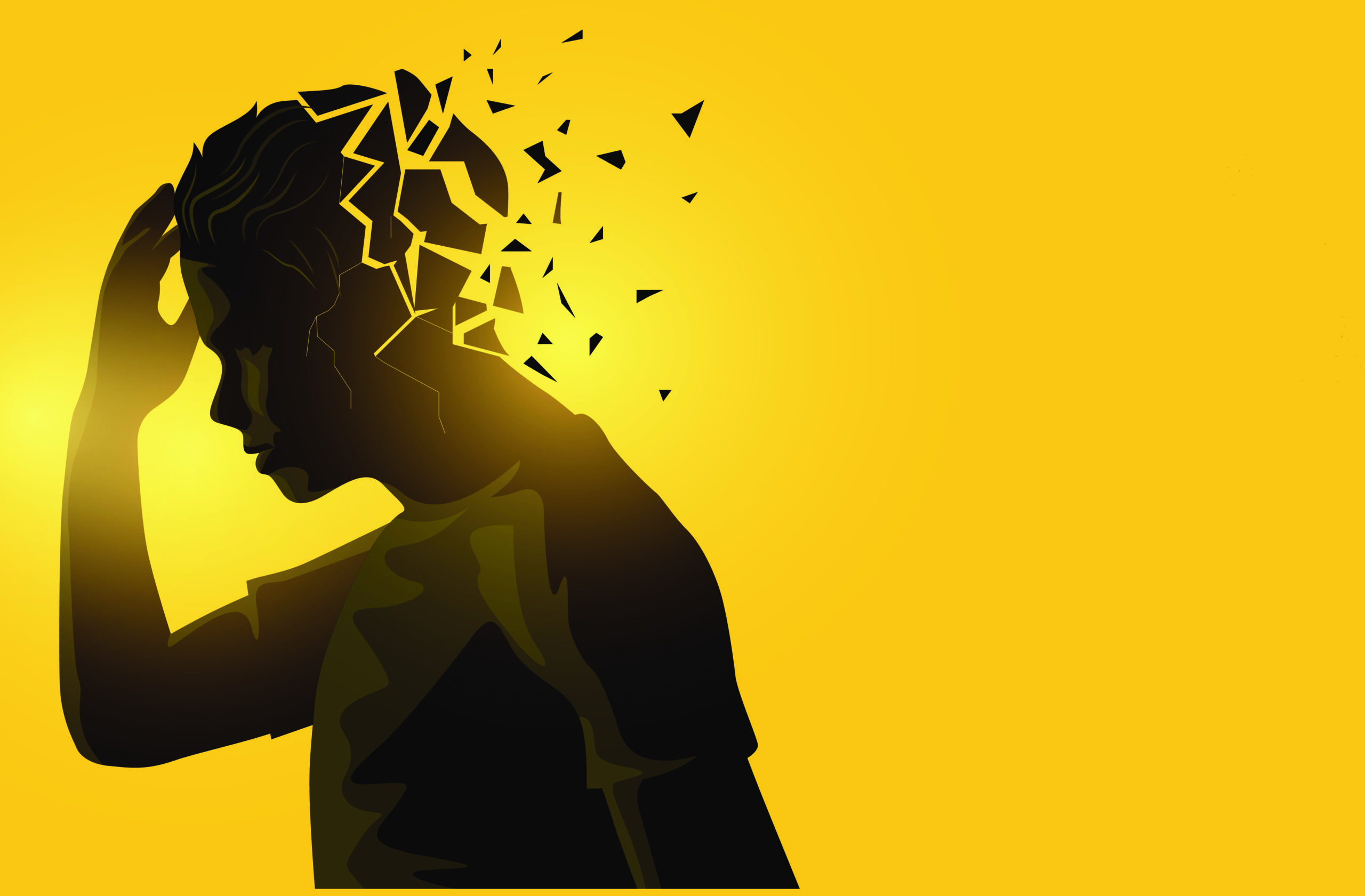by Yvette C. Hammett
Anxiety is more than just a feeling. It is a mental illness suffered by as many as one in five Americans. Issues such as anxiety and depression are exacerbated by ongoing stress that often rears its head for many, especially this year. Many people’s lives have been completely uprooted by the pandemic, leaving people suddenly staring into an abyss of indefinite uncertainty. In this current state of instability, many people are struggling with anxiety or depression for the first time; they may even be unaware that what they are feeling is anxiety or depression. Since anxiety and depression are usually caused by prolonged stress, which can take many different shapes for different people, it is important to prioritize pinning down what your stressors are and take the time to take care of yourself, both mentally and physically. This article will explore anxiety and depression symptoms and provide coping mechanisms for those struggling with either of these mental illnesses.
If you have never experienced anxiety, you may be quick to write your symptoms off, but it is vital to recognize your anxiety and figure out its source. David H. Rosmarin, a Harvard Medical School assistant professor and founder of the Center of Anxiety, outlines three anxiety components. “There is cognition—the way people think—there is what people are doing and feeling, and third, what your body and emotions are telling you. The third category is where people feel their anxiety in terms of their bodies and emotions. Those are the canary in the coal mine.” Rosmarin stresses the importance for professionals to analyze what someone is dealing with and how they are responding to it across the three main components to determine how anxiety or depression manifests itself in each particular case.
“If you work for a construction company and you stop going to work or you get in an accident and avoid driving, those are not clear indicators of anxiety, but in context, those definitely are good indicators,” he said.
Anxiety and depression can grow to affect every aspect of a person’s life. If it is causing a person significant distress and inhibiting their ability to function in their daily life, they should seek help. Whether people are struggling with work, being unemployed or worried about their health, taking any steps towards understanding and working through their anxiety or depression is always a good idea. However, seeing a professional may not always be an immediate option; if this is the case, here are some ways to cope with anxiety.
Redirect your attention: One coping technique is to turn one’s attention away from the stress and anxiety and focus it elsewhere, maybe on a hobby, exercise, having a spa day or checking out a new movie or tv show. If none of these are enough to shift their attention off obsessive, anxious thoughts, there are plenty of other alternative techniques employed by professionals. For example, try mindfulness exercises like a “what if” rubber band. In this exercise, the rubber band goes on the person’s wrist, and every time they think or say “what if,” they pop the rubber band and try to replace that thought with something else.
Remember to take care of your physical health, too. Managing anxiety means you are also helping to take care of your physical health. According to the National Institute on Mental Health, 264 million people worldwide suffer from some form of anxiety disorder. More than 30% of U.S. adults experience an anxiety disorder at some point, with 19% experiencing it within the last year. The World Health Organization reports that 1 in 13 suffers from anxiety globally. These are the most common mental disorders and include specific phobias, depressive disorders and social phobias. So, people suffering from this are far from alone. However, since mental and physical health are intrinsically intertwined, they risk experiencing physical health problems. Therefore, managing physical health can help with managing anxiety and vice versa.
According to the National Alliance on Mental Illness, or NAMI, some of the most important steps people can take during these unsettling times is to focus on the positive, listen only to the experts and devise a list of steps they can take to keep their mental health, well, healthy. Focus on the response, whatever the crisis is they are facing.
According to NAMI, anxiety manifests itself in many ways, including causing emotional symptoms such as feelings of apprehension or dread, feeling tense or jumpy, feeling restless or irritable or anticipating the worst, and being vigilant for signs of danger. It can physically show up as a racing heart, sweats or tremors, headaches, fatigue, insomnia or an upset stomach, frequent urination or diarrhea.
Physical symptoms can be confused with other medical conditions such as heart disease or hyperthyroidism, so doctors will likely evaluate those first. The next step could be a referral to a mental health professional for an evaluation.
Maintain a Routine.
Maintaining a routine is also essential for helping to manage anxiety and depression. According to NAMI, for those who now find themselves working from home in isolation for the first time, it’s important to create a new routine to improve their mindset to help them feel more productive and maintain boundaries between work and home. Instead of grabbing a laptop and working from bed, experts suggest sticking to a regular bedtime, shower and dress every morning as if you were going to the office. And to keep regular working hours. Set the alarm every morning for the same time you usually would go into the office. People should also wear casual work clothes instead of sweats to remind themselves it is a workday.
Only use reliable sources for important information.
Instead of heading to Facebook to find the latest on the world’s news, for example, experts suggest going to a reliable website such as the Centers for Disease Control, their state unemployment website or a reputable university with experts in the field they seek information.
People struggling with anxiety or depression should plan for their health habits and do their best to avoid giving in to compulsive behavior. For those who struggle with OCD or anxiety about their physical health, this can be especially important. People should stick to the rules they set up, so anxiety cannot dictate their behavior.
Prioritize self-care.
Remember to take time to tend to your mental health. Find time in your day that is just for you to unwind and do something you enjoy. Throughout the day, make sure to check in with yourself and take a break or practice a mindfulness technique if needed. Practicing good mental hygiene can help people boost their psychological immunity.
According to the experts at Positive Psychology, “Behavioral activation” is a research-proven method people can use to help get themselves going. Behavioral activation is a structured, brief psychotherapeutic approach that aims to:
- Increase engagement in adaptive activities (which are often associated with the experience of pleasure or mastery).
- Decrease engagement in activities that contribute to depression or increase risk for depression.
- Solve problems that limit access to reward or that maintain or increase aversive control.
This technique for battling depression—specifically, the difficulty of getting motivated—uses principles of conditioning yourself by positively reconnecting with your environment. Unlike some depression therapies that may take one or two years of intensive training for therapists, these small techniques can be learned and shared within days. The University of Michigan College of Medicine offers a free log for those experiencing depression who want to use the Behavioral Activation technique.
Another technique people can use is identifying specific goals for their week and working toward meeting those goals. They include pleasurable activities consistent with the life they want to live. These goals can increase their contact with rewarding activities. So, if someone finds themself anxious or depressed, they can work on one such activity. This teaches them that behavior can affect their mood, helping them take charge of their depression or anxiety.
Be conscious of your physical well-being.
Exercise can be an excellent way for some people to relieve stress and boost their mood. Even if they cannot get to the gym, they can take a brisk walk while maintaining social distancing. Practicing yoga at home or working out with a virtual personal trainer are other options to try at home. If people are looking for something more intense, they can try resistance training or high-intensity interval training. These types of activities will release endorphins, which trigger positive feelings. Experts insist people should try to do some form of exercise for at least 15 to 30 minutes every day.
Practicing diaphragmatic breathing is another great daily habit. It is an excellent meditation exercise that helps people remain engaged in breathing, so there is less chance their minds will wander. It is a great relaxation technique that can lower the stress hormone level and the heartbeat and help people relax.
People concerned about anxiety should get into the habit of giving their bodies a scan daily. For instance, according to Rosmarin, “Heart palpitations are a common indicator, or they might feel a lump in their throat, muscle tension, back tension or a flutter in their stomach,” It is important to breathe and relax from head to toe.
Whatever activities people choose to get themselves motivated and fend off depression and anxiety, they should pick multiple essential activities that matter specifically to them. This way, when a person’s mood is down, and they find themselves experiencing anxiety, they will have a go-to list to refocus their mindset.
Don’t put too much emphasis on sleep.
Some people with anxiety or depression also have insomnia. If this is the case, it’s important for them not to dwell on sleeping. People continuously hear advice about getting a good night’s sleep, but putting too much focus on this can increase anxiety. People often wind up lying in bed, staring at the ceiling in the middle of the night, worrying about not getting sleep and how this will affect their day tomorrow. Instead, experts with the American Institute of Stress suggest getting up and watching TV, reading a book or listening to music to help redirect their mental channel. Listening to meditation on YouTube or using a meditation app can be helpful as well. Meditation can help observe their thoughts and take note of what is going on in their minds and bodies to work through the anxiety and hopefully get some rest.
Set a mealtime schedule.
People should, of course, avoid stress-snacking and, instead, stick to a consistent mealtime schedule. This can help maintain physical and mental equilibrium. Try to stick to eating meals around the same time every day. This will help with keeping a daily routine and help with over or under eating due to stress.
Avoid excessive alcohol drinking.
It is important not to turn to alcohol for consistent stress relief or overcome fear, boredom or social isolation. Instead, try any of the above techniques or seek professional help if nothing else is helping.
It’s also important to note that no evidence exists that shows alcohol has any protective effects against viruses or other infections. The opposite may be true since alcohol is associated with an increased risk of infections.
Stick with mental health treatment.
It may seem obvious, but it is worth remembering that people should keep an adequate supply of their medications on hand and take them regularly, as prescribed. If someone is experiencing anxiety escalation, they should reach out to a professional. They should also do their best not to skip scheduled therapy appointments. If getting to a therapist’s office is difficult, teletherapy is always an option if necessary. Checking their insurance will tell them what types of treatments their policy will cover. There is a stigma attached to taking medication for mental health disorders, but it can be a big part of healing for many. Since mental illness manifests differently for everyone, it is important to discuss the options with a professional and decide if taking medication is best.
Practice mindfulness.
Staying in the moment is essential. People should try to focus their attention on the present, rather than dwelling on an uncertain future or catastrophes yet to come. Tools like yoga, prayer or meditation can help manage stress. Mindfulness can help temper emotional reactions.
Be kind to yourself.
Research shows that self-compassion works for coping with emotional adversity and challenges people may encounter. It can help to acknowledge struggles in times of isolation with kindness, rather than self-judgment. People should also be aware that they are among millions of people experiencing similar issues. The University of California San Diego’s Center for Mindfulness offers free guided meditations and useful information on mindfulness.
Learning essential strategies can help people manage and move forward, whether they have everyday stress, anxiety or an anxiety disorder. Adequate sleep, exercise, and good nutrition help reduce stress and contribute to a person’s well-being, so being kind to yourself both mentally and physically is essential.
The Substance Abuse and Mental Health Services Administration offers a national helpline that is free, confidential and available 24/7 for treatment referral and information for anyone facing mental or substance use disorders. That number is 800-662-HELP (4357). Counseling and psychotherapies seek to change behavior, emotions, thoughts and how people manage symptoms.
Here are a few recommended strategies from various experts that people can implement on their own:
- Find a therapist if you have not already. This helps many people to improve their quality of life significantly.
- Also, stay connected the best ways you can while protecting your health. These are challenging times, but we are fortunate that we can maintain connections at a distance in this digital age. Use Zoom, Facetime or Skype to maintain relationships. Decide how to use them best, whether doing crafts virtually with the grandkids or hosting a virtual happy hour with old friends.
- Play online games with your Mom or Dad or pick up the phone and chat with them. Most importantly, maintain contact.
- Look for bright spots in your own life. That may be the fact that you still have a job or a new dog in the family. Be grateful for the things you do have in life and dwell on them a bit instead of the negative things. This helps bring a sense of peace and happiness to your everyday life.
- Share some sidewalk chalk art with your neighbors or decorate your windows with positivity. Sew masks for your friends and family and send thank you notes to essential workers in your community. Research shows that spreading joy can increase your sense of control in challenging times and help you feel more optimistic.
- Make positivity a priority today and every day. Remain calm, remain constructive. This will help you navigate through your difficulties.
- Consider creating a gratefulness journal. Note specific items for which you are thankful, including your home, your family, your health, the food you eat and the little things that make you happy, like your morning cup of coffee. Include as much detail as possible on every point for which you are grateful.
- Remember the old saying, “laughter is the best medicine?” It is undoubtedly good medicine. Numerous studies show that there are both short-term and longterm benefits to laughter for our body and our mind. It stimulates your organs, improves blood circulation, lowers stress levels and strengthens your immune system. Laughter can even help relieve physical pain.
- Don’t stick around in negative situations that can leave you feeling insecure, frightened, distressed and pessimistic. Recognize when you are in such a case and, if possible, remove yourself from it. This will help contribute to your positivity.
- Do not obsess over the news. Stay informed, but do not become consumed. None of us can maintain a healthy balance and control over our mental health if we allow ourselves to be eaten alive by a daily barrage of information.
- Draw on your belief system to help you get through these stressful times. That may be religious faith or only faith in science, humanity and good healthcare.
- Focus on your commitment to living in a better world, help others, do the right thing and show kindness and empathy. Believe in yourself.
- Most anxiety stems from our inability to handle challenges properly. Push yourself to take uncomfortable steps, when necessary, to get past the stress and anxiety. The goal is to keep yourself healthy and afloat until the storm passes.
- Maintaining your mental health during these stressful times means you must keep your overall well-being. Your mental health condition affects your thinking, behavior, mood and feelings in a way that influences your ability to function every day. You should be aware of your situation and if you believe your mental health is worsening, call your healthcare provider.
In the self-help book by Kellene Diana, Live Out Loud: A Woman’s Guide to Kicking Anxiety, Depression and Fear in the Face, she states, “Self-help, partnered with professional help will make a difference,” and advocates for the importance of journaling. “One thing I did was journal,” said Diana, who works hand-in-hand with the Anxiety and Depression Association of America. “I wrote down my thoughts that were really outlandish. Once I would see them, I would detach them from myself. When you have a bad thought, you simply let it pass by and don’t attach it to yourself. Remind yourself that you are safe.”








Leave A Comment